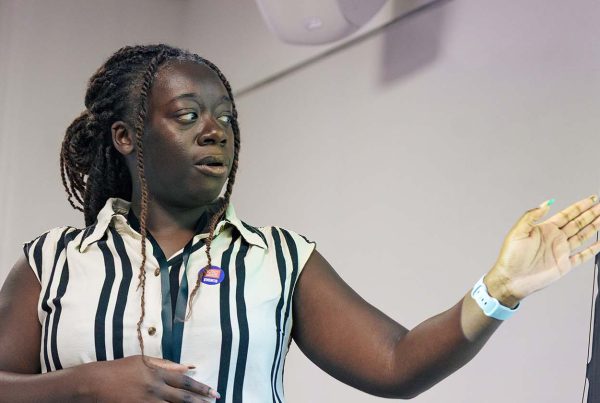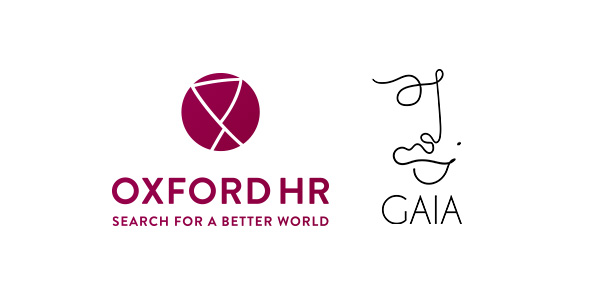Oxford HR’s inaugural Knowledge Festival ran from 19th-22nd this month. We were absolutely in awe at the insights and experiences that were voiced in our Zoom room from both our wonderful panelists and our attendees.
We created the Knowledge Festival in the hope of stimulating meaningful and important discussions within the for-purpose sector, using the wealth of experience within the Oxford HR community. We definitely achieved this aim and the Oxford HR team continue to be inspired by the strength of our networks!
Below are only short summaries of the discussions we held. Be sure to watch the full recordings for greater insight into these topics.
New Frontiers in Funding
John Rendel – Director of Grants, Peter Cundill Foundation
Katrin McMillan – CEO and Founder, Hello World
Moky Makura – Executive Director, Africa No Filter
Amel Karboul – CEO, Educations Outcomes Fund
We kicked off the week with a 90 minute delve into the realms of Funding; John Rendel started the panel by exploring some practical ways to help foster greater trust between funders and grantees. The big learning here was to build fewer, deeper partnerships. John explained that he felt unrestricted funding was absolutely crucial and that grantees need to be brave.
Dominic Bond, our moderator and Head of Practice for Philanthropies and Foundations, then moved to Katrin McMillan and asked about her experience of building greater trust. Katrin explored how sometimes it’s necessary to say ‘no’ to funders who are not a right fit for your organisation and to assess whether a heavily restricted fund is worth it. Katrin also noted that the best donors, in her opinion, are the ones that understand that the most important thing we can do is listen to the communities we work with.
‘Trust is about relationships. We can simplify our sector if we go back to basics.’ – Katrin McMillan, Founder and CEO, Hello World
Moky Makura added to the conversation of power dynamics, saying that there’s a hierarchy and that Africa is at the bottom, with African women below even that. She suggests that ‘when organisations don’t have a clear strategy of what they want to achieve, it’s nearly impossible to shift that power dynamic. The strength of saying ‘no’ comes from knowing what you’ve been set up to do.’ Moky notes that this is especially critical for organisations in the global south, who want to get to the level of equal power.
Amel Karboul explained what she feels are the benefits of outcomes funding as the CEO of the Education Outcomes Fund and added that she has also had to say no to donors when they are not aligned with their strategy.
‘The important thing is to change the narrative and change the way we do things.’ – Amel Karboul
The discussion came to a close after the panel gave their views on some insightful questions provided by our attendees. You can watch the full panel here.
‘The role of the philanthropist is to take risk – sometimes they forget this.’ – Moky Makura
Inclusion for Climate Progress
Shweta Bahri – Co-Founder, Earth Warriors
Catriona Corfield – Head of Diversity and Inclusion, The Woodland Trust
Binyam Gebreyes – Researcher, IIED
Sarah Roberts – Interim CEO, Practical Action
Tuesday saw us move from Funding to the Environment, with a specific focus on Inclusion for Climate Progress. This was moderated by our Head of Practice for Environment, Climate and Conservation, Zoe Greenwood, who briefly explained the parameters of the discussion and what exactly we defined as ‘inclusion.’
Shweta, Co-Founder of Earth Warriors, started the discussion by explaining that being inclusive in the climate movement is extremely important, because the most affected groups are often the least represented and contribute the least to climate change. She then moved on to her primary focus, which is delivering climate education to school children.
‘They are actively campaigning for climate education, but sadly few of them are heard in the climate policy process.’ – Shweta Bahri
Zoe then moved to Catriona, who is Head of Diversity and Inclusion at the Woodland Trust. She noted that the inequalities that exist in the UK are often echoed in the environmental policy discussion and that voices are not heard in the policy space.
‘Organisations have the responsibility to look at their own processes and systems.’ – Catriona Corfield
The discussion then moved to the Least Developed Countries, when Binyam Gebreyes, a researcher at IIED emphasized the important point that vulnerable communities are not testing grounds for new initiatives and that local systems need to be strengthened. We also briefly touched on COP26 and whether or not it could be truly inclusive if, in-person, it were limited to those who had received a Covid vaccine and if virtual, whether it could be inclusive due to the technological limitations of rural communities in vulnerable areas.
‘This discussion is uncomfortable before it’s harmonious.’
Sarah Roberts, Interim CEO at Practical Action, mentioned that there were different ways to bring people into the conversations, from embedding staff into communities and through the power of storytelling, where people can relate to the experiences narrated. Sarah also noted that a positive to be seen is the fact that climate change has retained it’s importance despite the challenges of the past year and the pandemic. She says that there are opportunities to be had as everyone has had to adapt, but that we need to remain intentional in getting the right people in the room.
‘You have to find the right way to involve people in the conversation otherwise you’re not getting the right information’ – Sarah Roberts
The link to the full recording here.
Power of Partnerships
Donald Pols – Director, Milieudefensie Netherlands
Femy Pinto – Director, Non Timber Forest Products EP Philippines
Jennifer Bushee – Programme coordinator, WEMOS
Bart Romijn – Director, Partos
On Wednesday we held our invite-only discussion on Alliances and the Power of Partnerships. Donald Pols started the discussion by talking about Milieudefensie’s experience in the Green Livelihoods Alliance. He noted that this strengthened their organisation’s approach with regards to the Dutch government and that they continue learning daily from their partners’ experience in different regions. This allows organisational growth.
The discussion then moved to Femy Pinto, who discussed her experience with the Non-Timber Forest Products Exchange Programme. She noted advantages echoing Donald; being better represented at a higher level, shared decision making and strategy. A challenge that was mentioned was in the form of governance; coordinating 6 partners across 13 countries and ensuring that they are all on track can be difficult at times.
‘We are in the partnership in the hopes of tackling certain challenges’ – Femy Pinto
Jennifer Bushee moved the panel to speak about power. In particular, she talked about where power lies and how it can be invisible. She noted that it can come in the form of historical legacy, communication, it can be in silence, our identities and it can be in favouritism. These are all important elements to remember when considering the power relationships within alliances and partnerships and how they can affect collaborative leadership.
‘Use inclusive language and make people feel valued, give space for dialogue and call upon the quiet ones. Don’t be afraid to be vulnerable.’ – Jennifer Bushee, WEMOS
Bart Romijn at Partos bought the session to a close by talking about collaborative leadership and the SDGs. One emphasis was to remember that these are not local issues; they are issues at all levels. He mentions that leadership is not just managing organisations, but it’s about changing the systems in which we are engaged.
‘We need to engage in the conversation with our partners on moral dilemmas’ – Bart Romijn on the issue of integrity.
The full recording can be accessed here.
Enabling Diversity on the Board
Kevin Coutinho – Chair, The Windsor Fellowship
Dhivya O’Connor – CEO and Executive Producer, The Charity CEO Podcast
Dunola Oladapo – Founder and Trusee, Luton Lights
Rachel Barlow – Advisor to Associations and NGO Boards
We finished the week by talking about Board Diversity; the benefits, barriers and the role we can all play at an individual level to help achieve it. Sarah Engerer, our Head of Board and Advisory, began by talking about how bad practice continues in this space.
‘We need to help organisations feel prepared for bringing in people that don’t mirror them’ – Sarah Engerer
Oxford HR’s own Dr Rachel Barlow kicked off the discussions talking about why do we even talk about Diversity and why is it a good thing and how one of the motto’s within the EU is ‘United in Diversity’.
‘It is a pre-requisite that Diversity is a strength’ – Dr. Rachel Barlow
Kevin Coutinho spoke about the for-purpose sector in particular and that it’s crucial to get diversity right.
‘If the for-purpose sector doesn’t reflect the communities they serve, we don’t have agency to represent these communities.’ – Kevin Coutinho providing some valuable insight on the importance of board diversity
Kevin also noted the importance of data; we need to make better use of our data and identify the gaps so we can start to tackle the issues. Dunola Oladapo added to this, saying that we need representation when working for social good.
‘If people aren’t involved in the decision making process, the decisions are being imposed on them’ – Dunola Oladapo
Moving to Dhivya O’Connor, she spoke about unconscious bias within recruitment. The conversation also touched on the notion of elitism within Boards and how they can often feel like a ‘cosy gang.’ Dhivya also noted that diversity can often feel like a tick-box exercise, and the need to identify genuine diversity. We need to open up organisations to bring in wider diversity from other perspectives, rather than focus on ‘organisational fit.’
‘As more discussions come up, leaders are being made aware that this is not something they can ignore. Keep creating discussion groups, continuing dialogue’ – Dhivya O’Connor on how to trigger action
Our full discussion on Enabling Diversity on the Board, including our Question and Answer session, can be viewed here.

Ruth Davis
As the Strategic Engagement & Impact Lead and Co-Founder at Oxygen, I specialise in building strong partnerships, leading high-impact projects, and guiding organisations on how to embed sustainability into their communications and strategy. With a Master’s degree in Sustainable Development and a background in strategic and digital communications, I’ve worked with a wide range of organisations – from climate-focused startups and B Corps to membership bodies and community development charities. My experience spans brand development, messaging and strategy, and website projects, all with a clear focus on purpose and impact. At the core of my approach is collaboration. I’m passionate about aligning big ideas with practical action, helping teams turn values into value and purpose into progress.



